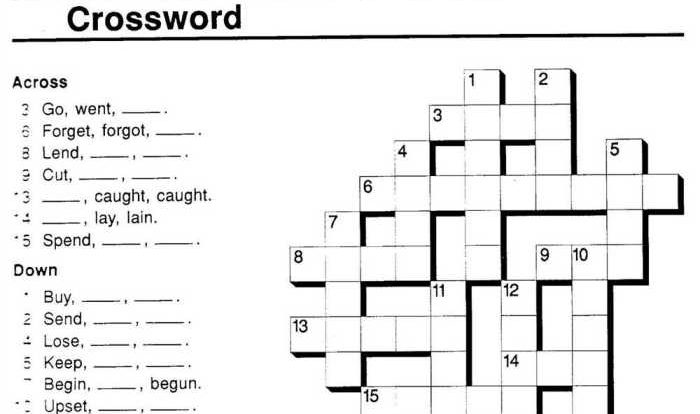Unit 8: Cold War and Decolonization explores the intertwined narratives of two pivotal historical developments that reshaped the global landscape in the post-World War II era. This captivating unit delves into the origins, key events, and profound impact of the Cold War and decolonization movements, providing a comprehensive understanding of their interconnectedness and lasting legacy.
The Cold War, characterized by the ideological divide between capitalism and communism, emerged as a defining feature of international relations. The rise of decolonization movements, fueled by aspirations for self-determination and independence, challenged the established colonial order. These transformative processes left an enduring mark on global politics, shaping the world we live in today.
Cold War Origins and Ideological Divide
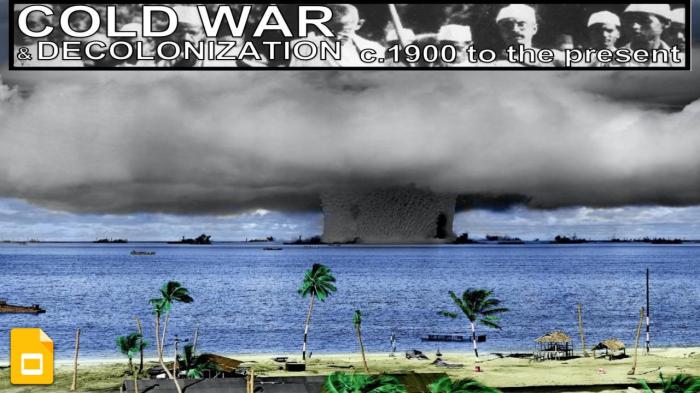
The end of World War II in 1945 marked a significant shift in the global geopolitical landscape. The war had weakened the European colonial powers, while the United States and the Soviet Union emerged as the dominant superpowers. The ideological differences between the two superpowers, rooted in their respective economic and political systems, became a primary source of tension and conflict.
Capitalism, the economic system of the United States and its allies, emphasizes private ownership of property and free market principles. On the other hand, communism, the economic system of the Soviet Union and its allies, advocates for collective ownership of property and a centrally planned economy.
These ideological differences had a profound impact on global relations. The United States and the Soviet Union competed for influence and allies around the world, leading to the formation of two rival blocs: the Western Bloc and the Eastern Bloc.
Key Events and Figures
Several key events and figures contributed to the Cold War tensions:
- The Truman Doctrine (1947): President Harry S. Truman’s declaration that the United States would support free peoples resisting communist aggression.
- The Marshall Plan (1948): A U.S.-led economic recovery program for Western Europe, designed to prevent the spread of communism.
- The Berlin Blockade (1948-1949): A Soviet attempt to cut off access to West Berlin, which was countered by a massive U.S. airlift.
- The Korean War (1950-1953): A proxy war between the United States and the Soviet Union, fought on the Korean Peninsula.
- Joseph Stalin: The leader of the Soviet Union from 1924 to 1953, who played a significant role in shaping the Cold War.
- Winston Churchill: The Prime Minister of the United Kingdom from 1940 to 1945 and 1951 to 1955, who famously described the Iron Curtain dividing Europe.
Key Events and Turning Points
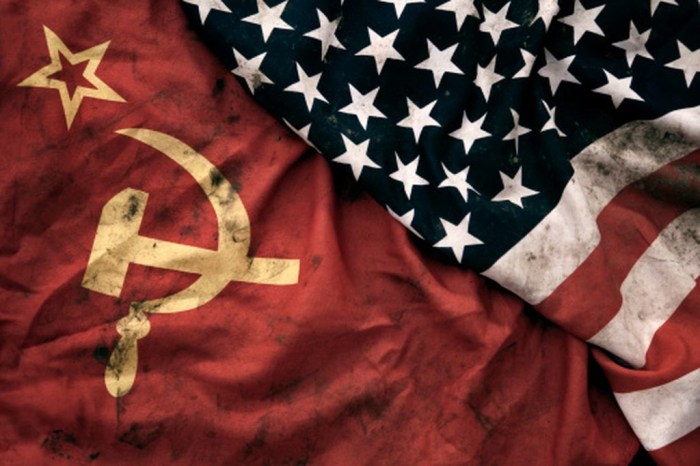
The Cold War was characterized by several pivotal events and turning points that shaped its trajectory and global politics. These events highlighted the ideological divide, nuclear tensions, and the geopolitical struggles between the United States and the Soviet Union.
Berlin Blockade
- Imposed by the Soviet Union from June 1948 to May 1949, the Berlin Blockade attempted to cut off West Berlin from the rest of Germany.
- The Western Allies responded with the Berlin Airlift, supplying the city with food and supplies via aircraft.
- The blockade demonstrated the Soviet Union’s aggressive stance and heightened tensions between the two superpowers.
Korean War
- A proxy war between the United States and the Soviet Union from 1950 to 1953, the Korean War resulted in the division of Korea into North and South.
- The war marked the first direct military conflict between the two superpowers and intensified the Cold War rivalry.
Cuban Missile Crisis
- In October 1962, the Cuban Missile Crisis brought the world to the brink of nuclear war.
- The Soviet Union had secretly deployed nuclear missiles in Cuba, prompting a US naval blockade and a tense diplomatic standoff.
- The crisis ended with the Soviet Union withdrawing its missiles in exchange for US guarantees not to invade Cuba.
Vietnam War
- The Vietnam War, from 1955 to 1975, was a protracted conflict between North Vietnam, backed by the Soviet Union, and South Vietnam, supported by the United States.
- The war became a major flashpoint in the Cold War, demonstrating the limitations of US military intervention and the resilience of communist movements in Southeast Asia.
Decolonization Movements
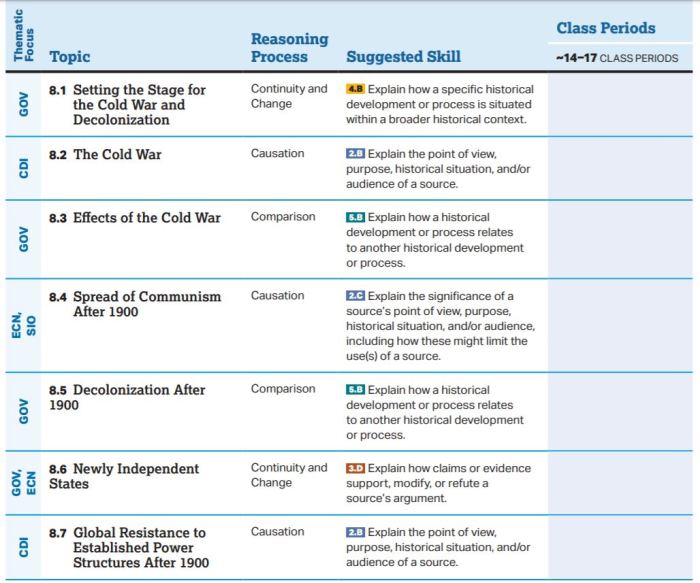
Following World War II, the process of decolonization gained momentum, leading to the independence of numerous colonies. This transformation was fueled by a confluence of factors, including the impact of the war, the rise of nationalist movements, and the changing global political landscape.
The war weakened European colonial powers, both economically and politically. This created an opportunity for colonized nations to assert their independence. Furthermore, the war exposed the hypocrisy of colonial powers, who had fought for freedom and democracy while denying these rights to their own colonies.
Key Leaders and Organizations, Unit 8: cold war and decolonization
The decolonization process was led by a diverse group of leaders and organizations. These included:
- Mahatma Gandhi: Led the Indian independence movement through nonviolent resistance.
- Ho Chi Minh: Led the Vietnamese independence movement against French colonial rule.
- Kwame Nkrumah: Led the Ghanaian independence movement and became the first president of Ghana.
- National Congress of India (INC): A political organization that played a key role in the Indian independence movement.
li>African National Congress (ANC): A South African organization that fought against apartheid and for the rights of black South Africans.
Methods and Strategies
Colonized nations employed various methods and strategies to achieve independence. These included:
- Nonviolent resistance: Advocated by leaders like Gandhi, this approach involved using peaceful protests, civil disobedience, and boycotts to pressure colonial powers.
- Armed resistance: Some colonized nations, such as Vietnam and Algeria, resorted to armed struggle to gain independence.
- Negotiation: Many colonies negotiated their independence through diplomatic channels, often with the support of international organizations like the United Nations.
Impact of the Cold War and Decolonization: Unit 8: Cold War And Decolonization
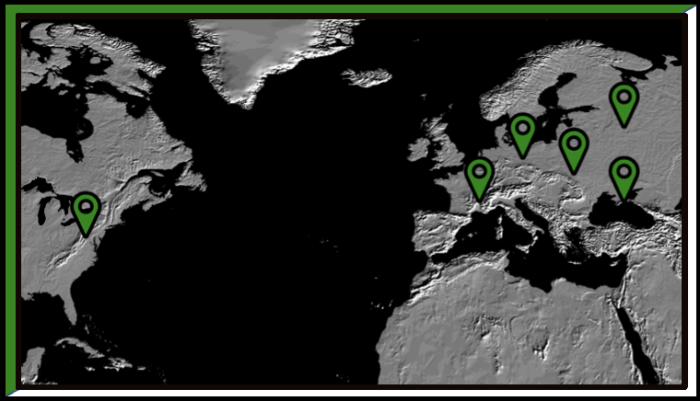
The Cold War and decolonization movements were deeply intertwined, shaping the geopolitical landscape of the 20th century. The Cold War, a global ideological struggle between the United States and the Soviet Union, influenced the decolonization process, while decolonization, the end of European colonial rule in Asia and Africa, had a significant impact on the Cold War’s dynamics.
Influence of the Cold War on Decolonization
The Cold War superpowers, the United States and the Soviet Union, competed for influence in newly independent nations. The United States, guided by its anti-communist stance, supported anti-communist leaders and movements in decolonizing countries. On the other hand, the Soviet Union backed communist and socialist movements, hoping to expand its sphere of influence.
This competition accelerated the decolonization process, as both superpowers sought to gain allies and secure strategic advantages.
Influence of Decolonization on the Cold War
Decolonization created new battlegrounds for the Cold War. The newly independent nations often became targets of superpower influence, as both the United States and the Soviet Union sought to align them with their respective blocs. Decolonization also led to the emergence of the Non-Aligned Movement, a group of countries that sought to remain neutral in the Cold War conflict.
Long-Term Effects of Decolonization
Decolonization had a profound impact on global politics. It led to the creation of dozens of new independent nations, altering the balance of power in the United Nations and other international organizations. The newly independent nations faced challenges in building stable governments, developing their economies, and navigating the complexities of the Cold War.
The legacy of colonialism and the challenges of post-colonial development continue to shape the political and economic landscape of many former colonies.
Key Figures and Leaders
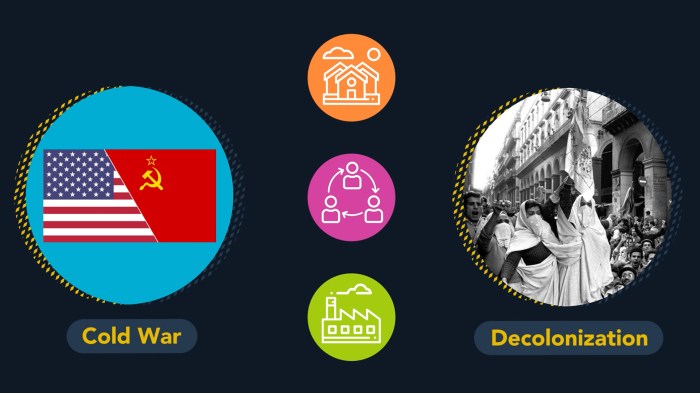
The Cold War and decolonization era witnessed the rise of several key figures who shaped the course of global events. Their ideologies, leadership, and actions had a profound impact on the post-World War II world.
Winston Churchill
- Role:British Prime Minister during World War II and the early Cold War
- Ideology:Anti-communist, advocate of Western democracy
- Contributions:Led Britain to victory in World War II, coined the term “Iron Curtain” to describe the division of Europe, and played a key role in the formation of NATO.
Joseph Stalin
- Role:Leader of the Soviet Union from 1924 to 1953
- Ideology:Marxist-Leninist, authoritarian dictator
- Contributions:Industrialized the Soviet Union, led the country to victory in World War II, and established a repressive regime that killed millions of people.
Ho Chi Minh
- Role:Leader of the Vietnamese independence movement
- Ideology:Marxist-Leninist, nationalist
- Contributions:Led Vietnam to independence from French colonial rule, established the Democratic Republic of Vietnam, and fought against the United States during the Vietnam War.
Nelson Mandela
- Role:Leader of the anti-apartheid movement in South Africa
- Ideology:Non-violent resistance, racial equality
- Contributions:Imprisoned for 27 years for his activism, became the first black president of South Africa, and worked to reconcile the country’s racial divide.
Legacy and Historical Perspectives
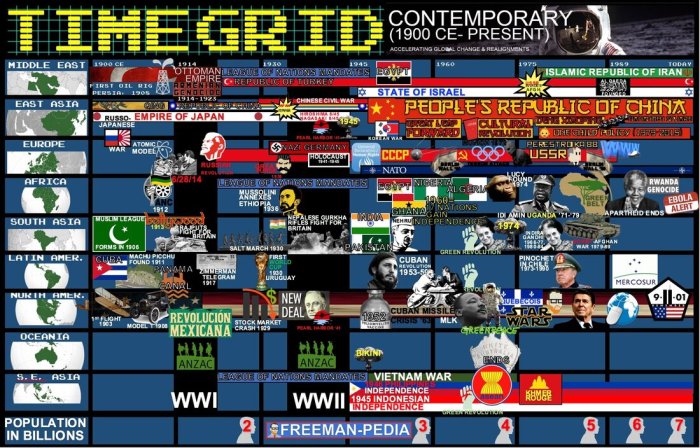
The Cold War and decolonization had profound and lasting consequences that continue to shape global politics today. The outcomes of these events have been the subject of much historical debate and interpretation.
Major Outcomes and Consequences
- Nuclear standoff and arms race:The Cold War was characterized by a nuclear standoff between the United States and the Soviet Union, leading to an unprecedented arms race and the threat of nuclear annihilation.
- Division of Europe:The Cold War divided Europe into two blocs: the Western bloc, aligned with the United States, and the Eastern bloc, aligned with the Soviet Union.
- Decolonization and the rise of new nations:Decolonization led to the independence of numerous colonies in Africa, Asia, and Latin America, creating new nations and altering the global balance of power.
- Ideological competition:The Cold War was a battle of ideologies between capitalism and communism, which influenced political and economic developments worldwide.
- Global conflicts and proxy wars:The Cold War fueled conflicts and proxy wars in various regions, such as the Korean War, the Vietnam War, and the Cuban Missile Crisis.
Historical Interpretations and Debates
Historical interpretations of the Cold War and decolonization vary widely. Some scholars emphasize the role of ideology, while others focus on economic and geopolitical factors. There is ongoing debate about the causes, consequences, and significance of these events.
Lasting Impact on Contemporary Global Politics
- Nuclear proliferation:The Cold War’s nuclear arms race has left a legacy of nuclear proliferation and the ongoing threat of nuclear conflict.
- Global divisions:The Cold War’s ideological divide continues to influence global politics, with divisions persisting between democratic and authoritarian regimes.
- Post-colonial challenges:Decolonization has created challenges for newly independent nations, including economic development, political stability, and ethnic conflict.
- Global interdependence:The Cold War and decolonization have fostered increased global interdependence, with nations interconnected through trade, technology, and communication.
Clarifying Questions
What were the primary causes of the Cold War?
The Cold War was primarily driven by the ideological divide between capitalism and communism, the emergence of the United States and the Soviet Union as superpowers, and the post-World War II geopolitical landscape.
How did the Cold War influence the decolonization process?
The Cold War provided both opportunities and challenges for decolonization movements. On the one hand, the superpowers’ competition for influence in newly independent nations fueled conflicts and proxy wars. On the other hand, the Cold War also raised global awareness of the issue of colonialism and provided a platform for decolonization advocates.
What were the long-term effects of decolonization?
Decolonization led to the emergence of dozens of newly independent nations, the redrawing of global political boundaries, and the rise of the Global South. It also contributed to the spread of democratic ideals and the establishment of international organizations such as the United Nations.
